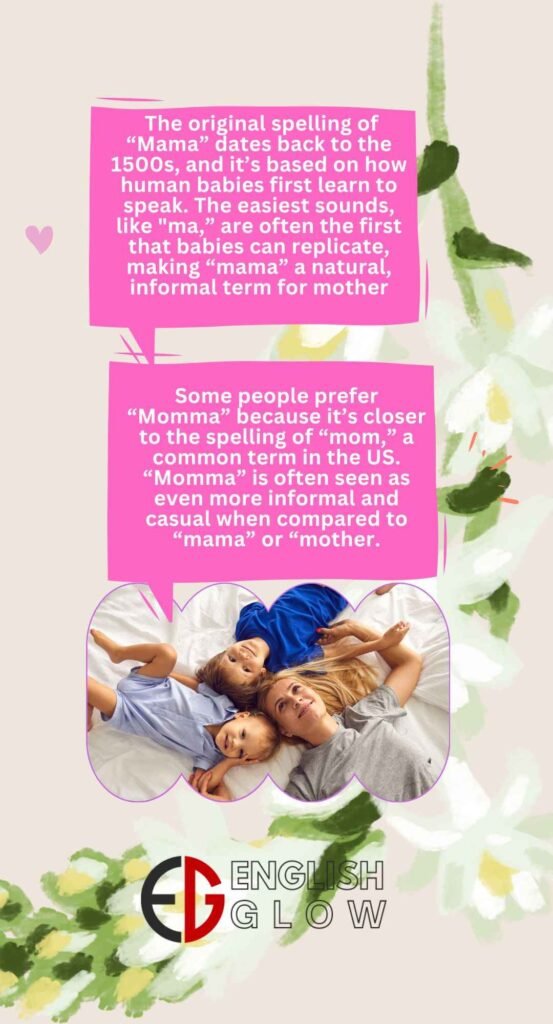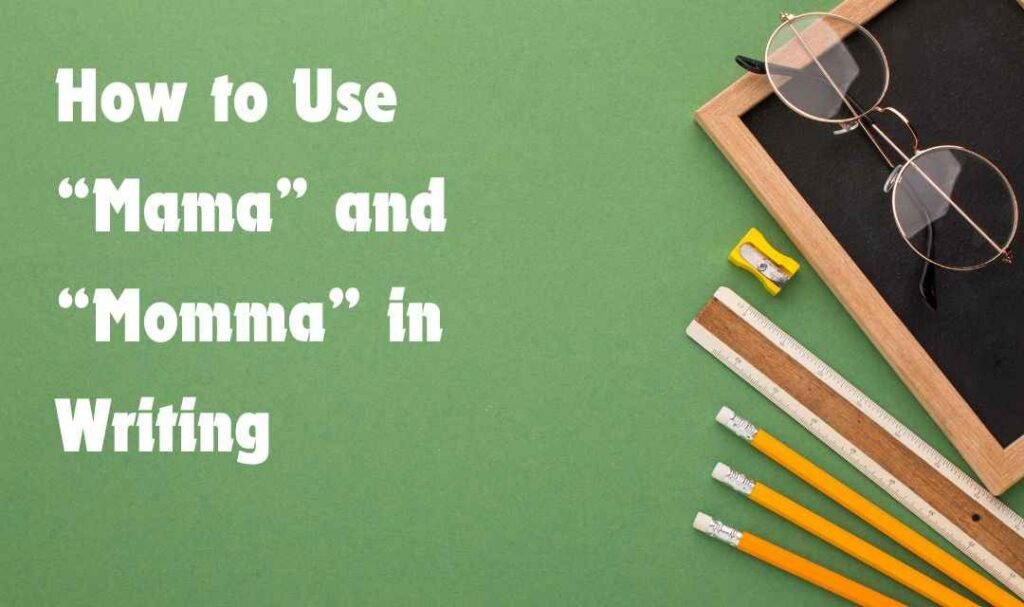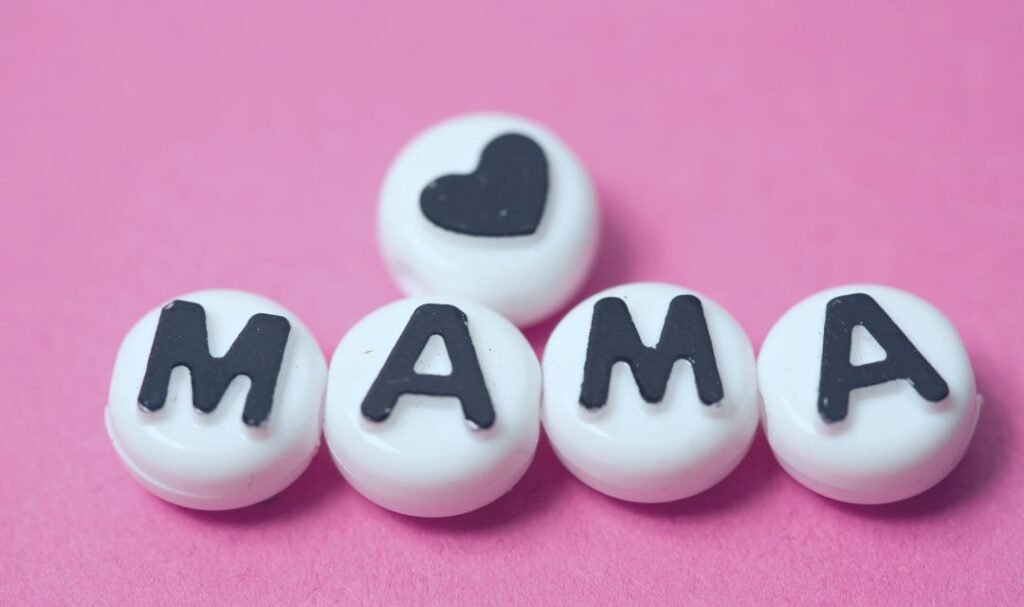When it comes to choosing between “Mama” and “Momma”, you might wonder which is the correct choice. Both words are correct and essentially mean the same thing as they are informal terms for “mother”. However, the spelling and pronunciation of these words can vary depending on culture and geography. For example, “Momma” is more commonly used in American English, while “Mama” tends to be more common in British English and other English-speaking regions.
The variants of these diminutives are widely understood across different regions, making them both accepted choices. It’s often a matter of personal preference and regional norms when deciding which spelling to use. If you prefer “Momma”, especially in American English, that’s perfectly fine. Similarly, “Mama” is just as valid, particularly in British English contexts. The key is to be consistent in your usage to avoid confusion. So, whether you go with “Mama” or “Momma”, rest assured that both are correct spellings and are widely understood as affectionate terms for “mother”.
Momma Or Mama – Which One is Correct?
When deciding between “Momma” and “Mama”, it’s helpful to understand the key differences rooted in American English and British English. The original spelling of “Mama” dates back to the 1500s, and it’s based on how human babies first learn to speak. The easiest sounds, like “ma,” are often the first that babies can replicate, making “mama” a natural, informal term for mother. Over time, “Mama” became a common way for young children to refer to their mothers, though anyone can use it. This word is typically based on personal preference and regional norms.
On the other hand, “Momma” is a variant that emerged in the 1800s and is more common in American English, especially in the southern United States. Some people prefer “Momma” because it’s closer to the spelling of “mom,” a common term in the US. “Momma” is often seen as even more informal and casual when compared to “mama” or “mother.” Despite these differences, both spellings are widely understood across different regions of the world, and the usage of each is often a matter of personal preference or regional norms.
Whether you choose “Mama” or “Momma”, both are recognized and understood in English-speaking areas. In the United Kingdom, “Mama” is more commonly found in many languages worldwide, while “Momma” is associated with certain regions of the US. The choice between them is not about correctness but rather about what feels most natural in your context.
You might enjoy reading: Thank You Both vs Thanks to Both of You: What is main difference
Regional Differences in the Use of “Mama” and “Momma”
Both “Mama” and “Momma” are correct spellings, but their usage can vary significantly depending on the region. In North American English, “Momma” is more common, especially in areas like California where I grew up. Here, the pronunciation of “Momma” and “Mama” is often the same, but the spelling differs based on cultural and family backgrounds. For instance, in Hispanic families, the spelling “Mama” is more prevalent, while “Momma” is frequently seen in Anglo or European immigrant families.
In California, unlike in Spanish-speaking contexts, “Momma” and “Mama” share the same orthographic variants with neutral vowels. The /ɑ/ sound is shorter than in words like ‘mobbed’ but longer than in ‘mopped’. Across the American west and Canada, ‘mom’ is the norm, with ‘mommy’ used by the very small children. On the other hand, in the UK and the southern hemisphere, the ‘u’ forms like ‘mum’ are more common, with a different rendition of ‘mama’ where the accent is on the second ‘ma’.
Where Did “Mama” Come From?
The term “Mama” originated from the Latin word “mamma,” which means “breast” or “mother’s breast.” It became a common term to refer to a mother or mother figure as a form of endearment. The origins of “mama” can be traced across many languages and cultures, making it a universal term with various variations in pronunciation and spelling. While “mama” is widely used, “momma” is another variation, showing how different languages and regions adapt this affectionate term
Tips for Choosing Between “Momma” and “Mama” in Sentences
- Momma and Mama are informal terms to refer to your mother, so the choice between them is often based on personal preference and regional variations.
- You can use “Mama” in a sentence like, “I love how Mama always knows how to make me feel better when I’m sad.”
- Another example with “Momma” might be, “Whenever I’m hungry, Momma is already preparing my favorite dinner.”
- Show appreciation by saying, “Thank you, Mama, for always being there to help with my homework and tell me a bedtime story.”
- If you miss your mother, you could say, “I really miss Momma when I’m away from home; she’s my biggest cheerleader.”
- Express love with, “I’m so grateful for Mama—she’s the heart of gold who holds our family”
- For a special moment, you might say, “Momma, you are my rock and the glue that keeps us safe and loved.”
- Celebrate small moments with, “Spending quality time with Mama at the park on the weekend is the best part of my week.”
- Show how lucky you are with, “I’m so lucky to have a caring Momma who loves me to the moon and back.”
- You can say, “Mama’s smile always brightens my day, and I look up to her as my hero.”
- “Momma, I’m grateful for all the sacrifices you’ve made, and I’m incredibly proud to be your child.”
- “When Mama bakes cookies, the entire house fills with the scent of love, making me feel safe and cherished.”
- “I treasure every moment with Momma—whether it’s a simple hug or just sitting together, she always makes me feel valued.”
- “Spending weekends at the park with Mama is something I will forever cherish; those moments add beauty to life.”
- “No matter how difficult things get, I know Momma will always be there to support me—she’s the solid foundation I rely on.”
- “Whenever I need advice or just someone to talk to, Mama is always there with a smile that brightens my day and a heart full of love.”
Questions You Might Ask About ‘Momma'”
- What is your fondest memory of Momma and how has she influenced your life?
- What is the best advice Momma has ever given you, and how do you apply it in your daily life?
- What are Momma’s favourite hobbies, and how does she show love through them?
- What is your favourite meal that Momma loves to cook for you?
- How does Momma handle stress and difficult situations?
- What values has Momma instilled in you, and how has your relationship with her evolved over the years?
- What do you admire most about Momma’s personality, and can you recall any funny or memorable moments with her?
- How has Momma supported you in pursuing your goals and dreams?
- What is Momma’s style or fashion sense like, and do you have a meaningful gift you’ve received from her?
- How does Momma celebrate special occasions or holidays?
- What is a childhood story about Momma that is particularly endearing or memorable?
- How would you describe Momma’s parenting style, and what books, movies, or music does she enjoy?
- What is the funniest thing Momma has ever said or done?
- Has Momma passed on any advice or traditions that you plan to continue?
- In what ways do you find yourself resembling or trying to emulate Momma in certain traits or characteristics?
- What sacrifices has Momma made that have inspired your passions and dreams for the future?
- How has Momma handled some of the biggest challenges in life, and what did you learn from her approach?
How to Use “Mama” and “Momma” in Writing
When writing and referring to your mother using terms like “mama” or “momma,” it’s important to understand how to use these words correctly. Both words can be used as a term of endearment and respect when referring to someone you care about. If you’re using either “mama” or “momma” in writing, make sure to stay consistent with the same version of the word throughout your text. For example, don’t start a note with “mama” and switch to “momma” later on.
In all forms of writing, when referring to a person in place of their name, “mama” or “momma” should be capitalized because it becomes a proper noun. On the other hand, when describing a generic parental relationship, you don’t need to capitalize these words. For example, in a sentence like, “I’m your mama, do it yourself,” the word “mama” remains lowercase. However, it is appropriate to capitalize when writing a greeting, such as, “Hi, Mama! How are you?
Familiar or Affectionate Tone
When you want to refer to your mother in a familiar and affectionate manner, both “momma” and “mama” are perfect choices. These terms convey a sense of closeness and warmth, making them ideal for moments when you want to express love and care. For instance, saying “Thanks, Mama,” or “I love you, Momma,” instantly brings a personal and tender feeling to the conversation.
Informal Settings
Guidelines for using “momma” and “mama” are generally straightforward. These terms are commonly used in informal settings, especially within family circles or among close friends. They are appropriate in these contexts, but might not fit as well in more formal or professional contexts. For example, you might use “mama” when texting a friend about your weekend, but in a business email, you would likely stick with “mother.”
Personal Preference
Your choice between “momma” and “mama” can vary depending on your personal preference. Some people naturally gravitate toward one term over the other, influenced by regional or cultural differences. In certain parts of the United States, “momma” might be more prevalent, while “mama” could be the go-to in other countries or cultures.
Cultural or Regional Variations
The use of “momma” or “mama” often depends on cultural and regional variations. For example, “momma” is more commonly heard in certain parts of the United States, while “mama” is widely recognized across different cultures and countries. It’s important to consider these factors when choosing which term to use, as they can reflect your relationship with your mother and the context you’re in.
Context and Relationship
The context and relationship you have with your mother play a significant role in determining whether to use “momma” or “mama.” If your bond is close and affectionate, “momma” or “mama” might feel more natural and fitting. On the other hand, if the relationship is more formal or distant, you might prefer using “mom” or “mother.” Ultimately, the choice is a personal one and can vary based on individual preferences, cultural influences, and what feels most comfortable and appropriate in a specific situation
You might enjoy reading: Master S Tongue Twisters for Quick Speech Improvement
Here are some idiomatic expressions that include the word “mama”
Mama’s Boy
One common phrase is “Mama’s boy,” which refers to a man who is overly attached to his mother and often seeks her approval or permission for almost everything. This expression can be used in a pejorative sense to describe someone who is too dependent on their mother, implying that they may lack independence.
Mama Bear
Another well-known idiom is “Mama bear.” This term is used to describe a mother who is fiercely protective of her children, much like a bear defending its cubs. It’s a positive expression that highlights a mother’s strong instinct to protect her family.
Sugar Mama
The phrase “Sugar mama” refers to an older woman who financially supports a younger romantic partner. This idiomatic expression often carries the implication that the relationship is based on material benefits rather than genuine affection.
I Didn’t Raise No Fool
Another useful idiom is “I didn’t raise no fool,” which people use to assert that they are not foolish and are quite capable of making sensible decisions. The implication here is that the person was raised well and knows how to handle themselves in various situations.
These idioms are widely recognized in English and effectively communicate ideas related to specific characteristics and concepts tied to the word “mama.”
Momma and Mama: Formality and Usage
The terms momma and mama are generally considered informal ways of referring to a mother. These words are often used in a familiar and affectionate manner, reflecting a close bond. The choice between momma and mama can vary depending on personal preference and cultural or regional differences. In some cultures, these terms are seen as less formal options compared to “mother” or “mum,” which might be used in more formal or public settings.
How Do British People Say Mama?
In British English, people typically say “mum” instead of “mama” when referring to their mothers. The term “mum” is commonly used across the UK, with the pronunciation being closer to “muhm.” This is different from American English, where “momma” or “mama” might be more prevalent.
Momma in Literature
The word momma and its variations are often used in literature to evoke themes of familial bonds, motherhood, and the nurturing role of mothers. In many instances, authors use “momma” to highlight the closeness and warmth in mother-child relationships. For example, in Gloria Naylor’s novel, Mama Day, the character Mama Day is a central figure in the story, symbolizing the strong familial connections and traditions passed down through generations. Her role is a prominent symbol of the ties that bind families together, and the usage of “mama” in this context illustrates how literature can portray the concept of motherhood and its impact on the lives of the characters.
Does Every Culture Say Mama?
In many cultures, the term mama, mamma, or momma is used to refer to mothers, but the specific terms and pronunciations can vary across different languages and cultures. For instance, in Spanish, the term is “mamá,” while in French it is “maman.” Other variations include “mom” in English, “umma” in Swahili, and “umma” in Korean. These differences reflect the unique regional and dialectal influences on language, with each culture having its own spelling and grammatical conventions. Despite these variations, the concept of “mama” is universally understood, making it one of the most common ways to refer to a mother worldwide.
FAQ
Do you spell mama or momma?
Both “mama” and “momma” are correct spellings. The choice between them typically depends on personal preference or regional variations.
Is it baby mama or momma?
The correct term is “baby mama.” It’s a widely recognized expression referring to the mother of someone’s child, especially outside of a marital relationship.
How do southerners spell momma?
In the Southern United States, “momma” is the more common spelling. It reflects the informal and affectionate way many Southerners refer to their mothers.
Is it momma or mama bear?
The correct term is “mama bear.” This expression is used to describe a mother who is fiercely protective of her children, much like a bear with her cubs.
You might enjoy reading: How Does It Work or How It Works? Uncover the Key Difference Now!






